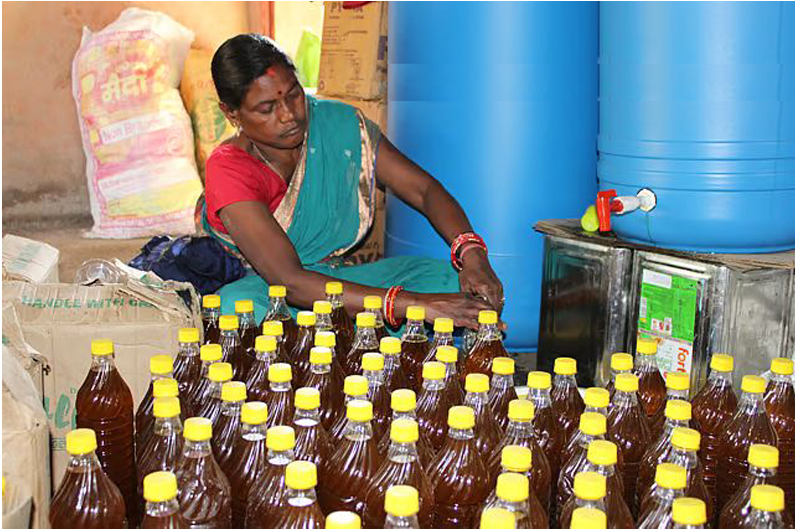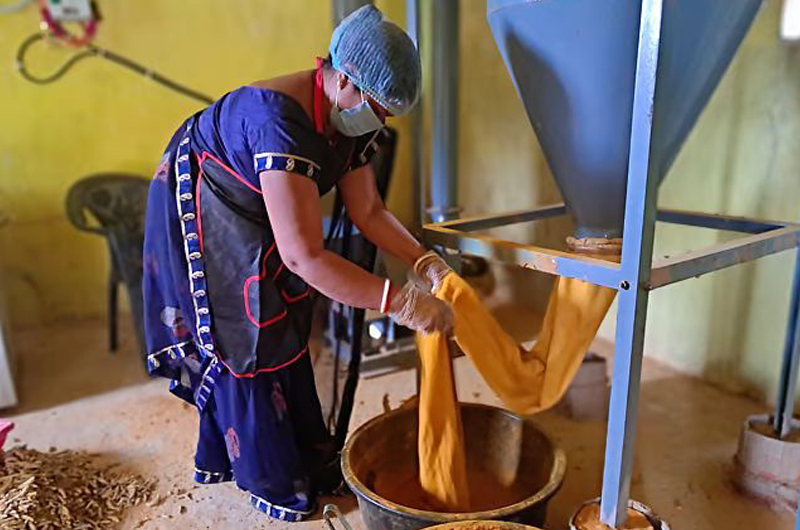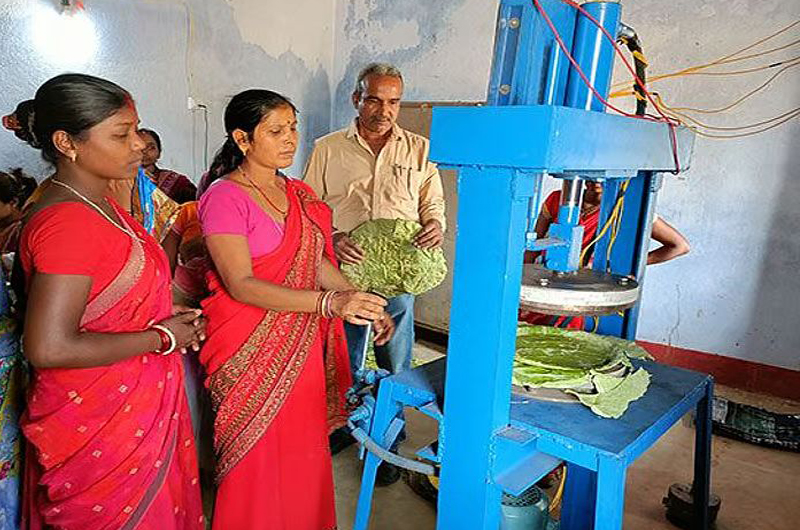In a remote village in Gumla, Jharkhand, a transformation began with the arrival of solar power. Tired of the unreliable electricity supply from the grid, the villagers, led by some enterprising women, decided to take matters into their own hands. They approached Mlinda Charitable Trust, a UK-based charity that has emerged as a transformative force, bringing not only renewable energy but also a sustainable ecosystem of growth and resilience to such underserved regions. This article is by Amita Bhaduri, who describes how this newfound energy independence unlocked a wave of possibilities
The midday sun beat down on Bhukni Devi’s village Gunia in Gumla, Jharkhand, casting long shadows across the dusty ground. For years, her life had followed a familiar rhythm: tending to her household, working the fields, the days blurring into a monotonous routine. But something had shifted. A hum of activity now filled the air, a testament to the quiet revolution taking place within this small community. Bhukni, a woman in her 40s, stood proudly beside a gleaming mustard oil processing unit, its sleek machinery powered by the very sun that warmed the land. “Before, our lives revolved around the farm,” she explained, her eyes twinkling with a newfound sense of purpose. “Now, we have a business.”
The transformation began with the arrival of solar power. Tired of the unreliable electricity supply from the grid, the villagers, led by enterprising women like Bhukni, decided to take matters into their own hands. They approached Mlinda Charitable Trust (MCT), a UK-based charity that has emerged as a transformative force, bringing not only renewable energy but also a sustainable ecosystem of growth and resilience to these underserved regions. They installed a 30-kilowatt solar mini-grid, a beacon of hope in the remote area.
In the deeply forested and undulating terrains of Jharkhand, the district of Gumla stands as a testament to the challenges of development in India’s most marginalised regions. Predominantly inhabited by tribal populations, the district grapples with interlinked problems of poverty, climate change and limited economic opportunities. Rain-fed agriculture, erratic rainfall and depleting biodiversity have left the local communities vulnerable, while unreliable electricity supply and a lack of modern infrastructure have stifled their potential for growth.
This newfound energy independence unlocked a wave of possibilities. Bhukni and her fellow villagers seized the opportunity, establishing a small-scale mustard oil processing unit. From 10 am to 3 pm each day, the rhythmic clatter of machinery filled the air as they transformed mustard cake into the golden oil. “This is more than just a job,” Bhukni declared, her voice brimming with confidence. “This is a path to a better future for our children. The extra income will allow them to pursue their dreams, to break free from the limitations that have held us back for so long.” Amidst this backdrop, MCT’s work transcends conventional development initiatives by blending clean energy access with micro-enterprise promotion, value chain development and climate-smart agricultural practices.

small-scale mustard oil processing unit.
Meeting complex challenges with sustainable economic development
Gumla, categorised as an ‘aspirational district’ by NITI Aayog, reflects the stark realities of rural underdevelopment. With 30.76 per cent of the population classified as multi-dimensionally poor, the district faces chronic poverty, worsened by its high tribal population. Rising maximum temperatures (up to 0.99°C over three decades) and erratic monsoons have drastically reduced crop productivity. Each 1°C rise during critical crop stages lowers rice yields by 10.2 quintals per hectare.
Rural households and enterprises receive only 10-15 hours of electricity daily from the grid, with severe voltage and reliability issues. Farmers and small enterprise owners often resort to diesel-powered equipment, which is costly and pollutes the environment. With limited livelihood diversification and inadequate opportunities for women and indigenous communities, informal wage labour dominates income generation, perpetuating cycles of low income and vulnerability.
MCT has developed a model for sustainable rural development, centered around decentralised renewable energy solutions. Their flagship project on replication of decentralised solar mini-grid-based micro-enterprise development and sustainable livelihoods, seeks to tackle these challenges head-on by blending energy access with economic empowerment, environmental stewardship, and social inclusion. At the heart of MCT’s work are solar mini-grids, decentralised energy systems designed to provide clean, reliable electricity to underserved communities. These grids are more than just an energy solution—they’re an engine for economic and social transformation.
“Mlinda currently operates 44 solar mini-grids with a combined installed capacity of 1,024 kWp, delivering uninterrupted power to 10,500 households and 1,271 enterprises in the region. Mini-grids are co-owned by local farmer producer organizations (FPOs) or cluster level federations, ensuring long-term sustainability and local buy-in. Mlinda Sustainable Energy Private Limited (MSEPL) provides technical expertise, while local youth are trained to operate and maintain the systems,” says Shelly Kerketta, MCT Managing Director. The grids have replaced diesel generators and kerosene lamps, reducing 285 kg of CO2 emissions per household annually and saving 116,328 liters of diesel in the project areas. The project is registered by MSEPL with the registry and has been generating carbon credits since 2018. Each carbon credit generates approximately 4.5 Euros (Rs 400), and these earnings are used to subsidise new connections.
As per carbon credits guidelines and calculation methodologies, the carbon credits are calculated on the basis of two factors: the quantity of renewable energy generated and supplied to end-use customers. So, greater the quantity of electricity generated and supplied; more carbon credits would be accrued. The electricity consumption level or scale of individual end-use customers is another factor.
Transforming agriculture through energy, knowledge
Agriculture is the backbone of Jharkhand’s rural economy, and MCT’s interventions focus on increasing productivity, resilience, and income for farmers.
- Solar-powered irrigation:Farmers now have access to solar-powered pumps that deliver consistent and affordable water for irrigation. 72 per cent of farmers with these pumps rely exclusively on solar energy, citing stable voltage and cost savings as key benefits. Irrigated land area has increased, enabling multiple cropping cycles and higher yields.
- Crop diversification:MCT has introduced high-value, climate-resilient crops such as mustard, turmeric, groundnuts, and sweet corn, which require less water and fetch premium prices in markets. Exposure visits and training sessions equip farmers with the knowledge to adopt these new crops.
- Sustainable practices:Training in organic farming and bio-fertilizer use has helped reduce dependency on chemical inputs, improving soil health and long-term productivity. Farmers now practice climate-smart agriculture, mitigating the effects of erratic weather.

Building micro-enterprises: from subsistence to prosperity
One of MCT’s most transformative impacts has been the creation of a thriving rural economy powered by solar energy.
- Agro-processing units: Oil expellers, turmeric processing units, and groundnut de-shelling machines powered by solar grids allow farmers to add value to their produce. These enterprises are often run by FPOs or self-help groups, enabling collective ownership and profit-sharing. For example, mustard farmers earn Rs 20,000-25,000 per acre, while oil expelling units processing 5 tons of seeds per month generate Rs 15,000-20,000 in profits.
- Non-farm businesses: Cement brick-making units, welding shops, and leaf plate manufacturing businesses provide diversified income streams. Service-oriented businesses like photocopy shops, saloons, and common service centres cater to local needs while creating employment.
- Women-led enterprises: Women, traditionally excluded from economic activities, now play a pivotal role as entrepreneurs. Over 30 per cent of the enterprises are owned or managed by women, empowering them financially and socially.
MCT ensures that rural producers and entrepreneurs can connect with broader markets and financial institutions. Mlinda facilitates the aggregation of raw materials (mustard, turmeric, tamarind) and links producers with urban and regional buyers. Bulk buyers in Ranchi and other cities purchase value-added products at premium prices. Partnerships with government schemes, and Mudra loans enable entrepreneurs to access affordable loans. MSEPL also provides zero-interest loans for energy-efficient devices.
MCT’s interventions in Jharkhand serve as a model for scaling sustainable development in similar regions. The approach can be replicated in other underdeveloped areas of Chhattisgarh and Odisha, particularly those with high tribal populations and dependence on agriculture. The key elements of the model include: (a) installation of solar mini-grids in underserved villages (ii) community-driven ownership and operation of energy systems (iii) integration of clean energy with livelihood promotion, particularly micro-enterprises and value chains, and (iv) leveraging government schemes for financial and technical support.
(Courtesy: India Water Portal/ indiawaterportal.org)



 from Webdoux
from Webdoux